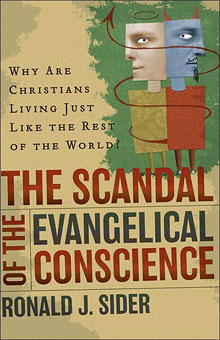Book Notes
 Ronald J. Sider, The Scandal of the Evangelical Conscience; Why Are Christians Living Just Like the Rest of the World? (Grand Rapids: Baker Book House, 2005), 140pp.
Ronald J. Sider, The Scandal of the Evangelical Conscience; Why Are Christians Living Just Like the Rest of the World? (Grand Rapids: Baker Book House, 2005), 140pp.
In 1947 Carl Henry (1913–2003), a leading light in the evangelical movement, published an important book entitled The Uneasy Conscience of Modern Fundamentalism in which he challenged conservative Christians to move beyond their personal and privatistic Gospel ghetto to engage the broader issues of society and culture. Exactly thirty years later, Ron Sider of Eastern Seminary in Philadelphia published a similar book that should be on every believer's short list of "must-reads," entitled Rich Christians in an Age of Hunger (1977). Both books are still in print, but judging from Sider's dismay in his most recent book, conservative believers have ignored their message. Sider's Scandal is a short, popular level, and fiery manifesto that does for evangelical social ethics what Mark Noll did for our paltry intellectual life in his book (also a must read) The Scandal of the Evangelical Mind (the scandal, according to Noll, is evangelicalism's rampant anti-intellectualism).
Drawing upon scientific polling from groups like Gallup and Barna, Sider takes the measure of American evangelicals on five data points: divorce, care for the poor, sexual infidelity, racism, and physical abuse in marriage. He is appalled. People who claim to be born again divorce at a slightly higher rate than the general population. Evangelicals give a meager 4% from their income. The most likely people to object to neighbors of a different race are white evangelicals. Sexual promiscuity among evangelical kids is rampant. Is it any wonder that "a mere 22% of people have a positive view of evangelicals" (p. 28)? Sider contrasts these findings from Chapter 1 with an overview in Chapter 2 of the Biblical vision of what God's kingdom on earth ought to look like, with successive paragraphs full of Scripture quotations from the Gospels, the book of Acts and the Epistles. In stark contrast to our current reputation, Sider notes that the early Christians had a well-known and well-deserved reputation for integrity and care for the weak. Tertullian (AD 155–220), for example, wrote, "Our care for the derelict and our active love have become our distinctive sign before the enemy...See, they say, how they love one another and how ready they are to die for each other." Even the pagan emperor Julian the Apostate (ruled AD 361–363) acknowledged the radically counter cultural life of the early Christians: "The godless Galileans feed not only their poor but ours" (p. 52).
Chapters 3 and 4 explore the causes of this demise, which Sider finds in "a cluster of unbiblical ideas and practices" that center around the notion of what the German pastor Dietrich Bonhoeffer called "cheap grace" and which express themselves in our relativism, individualism, and materialism. Instead of costly self-sacrifice, today the Gospel is construed as self-fulfillment. Not all Sider's news is so bleak, however, and in a final, fifth chapter he turns to "Rays of Hope." There are, in fact, "heroic and faithful" individual believers (p. 126). I count Sider as one of them. In his own effort to dethrone and desacralize the power of mammon, he was once in a small group that used annual IRS tax returns to discuss how families were spending their money (p. 113)! Clearly, many might find that invasive or extreme, but if Sider is right, we need a powerful antidote for a dreadful sickness.


